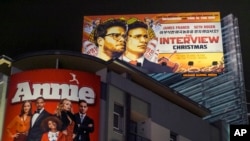U.S. officials are now publically tying North Korea to the cyber attack on Sony Pictures.
The FBI, the U.S. Federal Bureau of Investigation, announced Friday it has enough information to conclude the North Korean government is responsible for the hacking. The FBI said it is "deeply concerned."
The Sony film studio had been set to release a comedy film about a fictional plot to assassinate Pyongyang's leader, Kim Jong Un, but has since canceled the release following threats of terrorist attacks.
The massive breach resulted in the leak of tens of thousands of documents, including incriminating emails.
Sony announced Wednesday it was scrapping the December 25 release of "The Interview," after several major theater chains chose not to show the film. Sony has no current plans to release it.
A hacker group calling itself Guardians of Peace earlier promised a "bitter fate" to those who attend showings of "The Interview." The group invoked the September 11, 2001 attacks on the U.S. and warned people to "keep yourself distant" from theaters where the film is playing.
The U.S. Department of Homeland Security had said "there is no credible intelligence to indicate an active plot against movie theaters." President Barack Obama also downplayed the threat, saying his "recommendation would be that people go to the movies."
Australian National University Korea analyst Leonid Petrov tells VOA if the U.S. believes Pyongyang is responsible, its options are limited.
"I don't think the U.S. government has any leverage to influence North Korea. There's no negotiations, there's no diplomatic representation. There's no trade. There's basically no exchange, no joint projects."
The U.S. and its allies have already imposed round after round of economic sanctions on North Korea for its nuclear and missile programs. The sanctions have devastated the North's economy and left it isolated from the rest of the world, but also resistant to further punishment by it.
Remco Breuker, a professor of Korean studies at the Netherlands' Leiden University, agrees that the U.S. has few good choices.
"I think the only thing you can do is take a very tough line on what you think should happen. So if North Korea is behind this, the best thing the U.S. could do is make sure this picture does get released one way or the other and protect from further hacking attempts.
Many in Hollywood took to Twitter to speak out against Sony's decision to scrap the movie's release. Comedian Jimmy Kimmel called the move "an un-American act of cowardice that validates terrorist's actions and sets a terrifying precedent." Actor Rob Lowe declared it an "utter and complete victory" for the hackers. Steve Carell, whose own film set in North Korea has been canceled, said it was a "sad day for creative expression."




